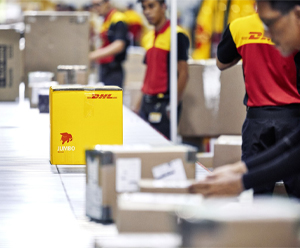DHL Express亞太區執行長Ken Lee支持電商成長的投資政策

新冠疫情期間,在醫療設備強勁需求,例如來自亞洲輸往其他地區的個人保護設備,以及封城期間實體店面關閉促使網路購物蓬勃發展的帶動下,電子商務的強勁成長明顯可見。
根據DHL Express最近公布的白皮書《B2B電子商務終極指南:傳統退場、數位正夯》(The Ultimate B2B E-commerce Guide: Tradition is out. Digital is in),相較於2019年,公司2020年B2C電子商務成長將近40%。
B2C部門的未來發展預估,已經顯現在過去幾年消費者電子商務的大幅崛起,以及假期銷售高峰(例如:復活節、耶誕節)與大規模購物節(例如:黑色星期五、網路星期一)的高成長率。
不過,數位化持續發展,加上消費者購物行為的改變,不只讓B2C電子商務受惠。2019年疫情爆發前,B2B電商網站與市集的全球銷售已經成長18.2%,達到12.2兆美元(10.26兆歐元),超越B2C產業的市值。
DHL Express亞太區執行長Ken Lee表示:「我們的工作與生活方式在2020年出現顯著改變。隨著世界轉往線上,增加與貿易流的連結,這已經反映在物流產能與效率的需求成長。DHL Express已經經歷亞太地區電子商務貨運的急遽成長。我們預期貨運量高峰將維持上揚趨勢。」
白皮書也預估,在2025年前,供應商與專業買家之間的所有B2B銷售互動,將在數位通路登場,相較於2019年的12.2兆美元(10.26兆歐元),B2B網路交易將在2027年大增逾70%來到20.9兆美元(17.58兆歐元)。
千禧世代登場
其他考量因素為新冠疫情對數位化速度的以想,以及熟悉科技的千禧世代採購行為。千禧世代現在不但是個人購物的B2C消費者,也是專業領域的B2B決策者。
根據白皮書,千禧世代目前已經占所有專業B2B採購決策的73%。
身為數位原生世代,他們在進行B2B交易時會反映日常購物經驗,推動公司投資數位解決方案(例如銷售平台),同時提供龐大的成長潛力。
需要更多投資
這已經促使快遞服務供應商更重視產業的長期趨勢,為了滿足預期的成長動能,強化他們的基礎建設。
為了滿足亞太區的變動區需求,DHL Express在關鍵市場投資將近6.9億歐元在基礎建設。
公司也宣布下單訂購8架波音777貨機,滿足國際快遞市場快速成長的需求。新飛機預定在2022年投入首批貨運。
目標為何?協助公司管理未來貨運量的成長,滿足限時快遞服務前所未見的成長需求。
Lee相信在電子商務及跨國貿易成長之際,這些計畫與投資,將確保DHL Express長期站穩腳步,繼續維持全球貿易的營運。
他解釋說:「這些投資計畫包括我們投入3.77億歐元擴建香港的DHL中亞轉運中心,使轉運中心有能力處理目前貨運量的6倍。」
我們也投資8000萬歐元,在日本大阪打造規模最大的配送設施,以及在南韓仁川建造1.31億歐元的轉運設施。
澳洲的投資包括位在雪梨的新服務中心,以及布里斯本、墨爾本及阿德雷得的設施擴建。
「我們已經有23架專機服務亞太地區,投資逾6000萬歐元擴大網絡涵蓋範圍。我們計畫引進更多航線,增加現有航線的頻率。」
「DHL Express將繼續升級區域及跨洲機隊的現代化,維持高效率及可靠的航運網絡」,Lee表示。





 繁體中文(台灣)
繁體中文(台灣)